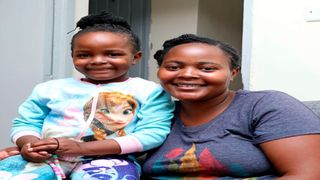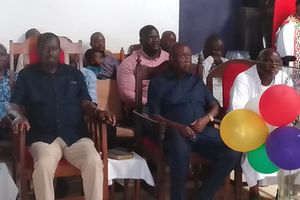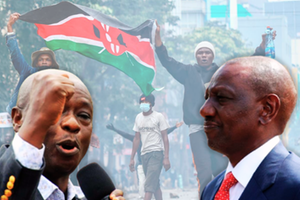
Flavian Naviole and her five-year-old daughter, daughter Tamia Akoth, during the interview at their home in Ngong on September 21, 2023. Tamia is suffering from Acute myelogenous leukemia (AML).
| Lucy Wanjiru | Nation Media GroupDN2
Premium
Raising a child with cancer
What you need to know:
- As a cancer patient now, Kanini Mishek's son has lost a year out of school because he had to shift from the village and live with her mother in their Kaloleni home in Nairobi.
- Different cancers require different tests but basically blood tests and imaging of body organs using either an ultrasound, CT Scan, MRI or even an Xray may be done.
Kanini Mishek, 36, received one of the most dreadful calls from her mother who lived with her son in the village. She told her that her son had been taken ill and he was not responding to treatment.
Kanini caught the next bus to her village in Mtito Andei. Her motherly instincts could not allow her to rest until she figured what was wrong with her son.
On arriving, Kanini learnt that her son had been diagnosed with malaria at the local hospital. However, the boy threw up each time he took the prescribed medicine.
This was last year, and he was only five.
“When I got home, I could not recognise my son. He had grown thin and I could literally count his bones. He was not the jovial son that I have always known. His stomach had bulged and his eyes sunken and he had diarrhoea and was vomiting non-stop. I was worried,” Kanini tells Parenting.
She took him to another hospital, one of a higher level and they told her that her child’s liver had shifted from right to left and they could not help.
“I doubted it,” she says.
The hospital did another check and diagnosed her son with cancer of the kidney. She was then referred to the Kenyatta National Hospital (KNH).

Kanini Mishek speaks about the challenges of raising her son Meshack Kioko who was diagnosed with cancer of the kidney in April 2022.
Kanini rode in an ambulance holding her sick child and trying to absorb the news she had received.
“I cried in intervals, stopping only to talk on the phone, then resumed crying. II didn’t cry because of the disease but how the news was broken to me. Wasn’t there another way to say it?”
“I had this innate fear of the Kenyatta National Hospital. That also contributed to my crying. A month prior, I had lost a friend there. I had heard stories of patients being delayed at the waiting bay before getting an admission. What if I lost my son sitting there?”
When she got to KNH, her fears were quashed. The admission process was smooth. The consultant oncologist who received her had kinder words to describe cancer.
“It’s just a swelling, and it will subside one day,” Kanini recalls what the doctor told her.
11 months later, her son has had 34 weeks of chemotherapy of about 12 cycles and he is now on a break.
Kanini now has to take an image of his son’s tumour to check whether the chemotherapy worked. She is hopeful but afraid. But as the sole parent of the child, where else can her son get solace from?
“When my son was born six years ago, he was a healthy baby. He weighed 4.5 kilograms and he never had any complications. In fact, I had enrolled him in school in the village and he was catching up,” Kanini narrates.
As a cancer patient now, her son has lost a year out of school because he had to shift from the village and live with her mother in their Kaloleni home in Nairobi.
“His life changed. When children get chemotherapy, they lose hair and at times vomit all the time. He loses appetite. Some of the children who may not understand what is happening in his life laugh at him and that makes him shy. He is now a loner,” she says.
Kanini still doesn’t know the cause of her child’s cancer, but the doctors asked her if they have any history with cancer in their family.
“I was told that cancer can either be caused by one’s lifestyle or their genetics,” she says.
Having accepted the situation, she now is the beacon of hope even for other parents at the cancer ward. She has learnt to take her child’s dietary needs seriously owing to how strong the cancer treatment can be.
“I give him a lot of greens and avoid sugary food. When he insists that he wants yoghurt, I get the plain one. I try to be near him so that his friends will not give him sugary food.”
She remembers not having any form of insurance before her child fell sick. It took a well-wisher from Hope for Cancer Kids who helped in paying for her National Hospital Insurance Fund (NHIF).
Her bill amounted to about Sh1.7million all of which were paid for by NHIF except for about Sh270,000 that she had to pay because her card was not active in the first months. She tried reaching out to the child’s paternal family who dismissed her for soliciting money.

Kanini Mishek outside her house in Kaloleni estate on September 19, 2023. Her child Meshack Kioko was diagnosed with cancer of the kidney in April 2022.
She laments however that since the year started, NHIF changed its terms and can only pay for cancer patients for up to six months, and only six cycles of chemotherapy.
“That makes parents lose hope and stop caring for their children especially when they don’t have the money.
One thing that has remained tough for Kanini to do is how tell her child that he is suffering from cancer.
“My son just knows that he has a problem with his stomach. I will one day tell him, maybe when he is 10 or older. He understands the processes but not the disease,” she says.
As a tailor who sometimes does menial jobs like washing clothes, Kanini sometimes fails to afford Sh1,100 to pay for doctor’s consultation fee.
“I just take loans when need be. Some of my friends help and I am grateful,” she says.
Being a cancer mom comes with some delusions and at times, prophets of doom even in the hospital can discourage someone.
“Sometimes when I sleep in my house, I dream of the hospital. I dream of the sick patients and how they are suffering. I think a lot about my son. I am afraid of having a second child. What if they get worse? I’d rather survive with this one. Even if he dies, I am okay being called mother of the late…or maybe, I may die before him,” she says.
***
Flavian Naviole , mother to Tamia Akoth
Flavian remembers the day her daughter had unusual fatigue accompanied with fever and she assumed that it could be malaria.
This was November 2020. However, her daughter felt better after a short while and she didn’t see the need to seek medical check-up.
One Friday, Flavian stepped out with her daughter to visit a friend and the little girl fainted.
“I didn’t take it seriously,” she recalls.
She carried her and by the time she was at her friend's place, her daughter had regained consciousness, but she fainted again -this time for a longer period.
“We took her in the house and my friend gave her first aid, she was sweating profusely and even had diarrhoea. That is when I took her to a hospital in Ngong,” she narrates.
At the hospital, the doctor took a blood test and the first thing they noticed was that Tamia had low blood levels.
“The doctor asked me to take my daughter for a second test, similar to the one that we had just to confirm that indeed she had low blood levels.”
That very evening, she was advised to go to the Kenyatta National Hospital for further check-up and was asked to buy a blood boosting drug in the meantime.
At KNH, her daughter was taken in as an inpatient. She had a series of tests which later came out as positive with Acute lymphoblastic leukemia.
The news was not broken to her in a great way and at first, she didn’t think that three years later, she would still have her daughter.
“When I called family and friends, everyone asked where the money for treatment would come from. They scared me about how bad cancer is and it took a toll on me,” she remembers.
“My child has been held by God. She had a relapse after medication. She is still trying to be strong and goes to school. The only thing I am cautious of is her getting an infection,” she adds.
When the relapse came, the doctors had to change her treatment regimen and this time the cancer was stronger. Flavian and her daughter had to stay in hospital for a year.
After radiotherapy was done, they transitioned to maintenance which is done from home.

Flavian Naviole and her five-year-old daughter, daughter Tamia Akoth, during the interview at their home in Ngong on September 21, 2023. Tamia is suffering from Acute myelogenous leukemia (AML).
“That’s the hardest part of care because you have to buy medicine and in cash. I use about Sh5000 for drugs,” she says.
Flavian says that any drug below Sh2,000 is not catered for by NHIF, they’d rather pay for the six cycles which have more expensive drugs.
In school, she tries to be discreet about Tamia’s condition alerting only her teachers about it.
“I haven’t told my child yet. I don’t know how to,” she says.
Flavian has also received vile comments from people around her, telling her to check family roots that may have caused her daughter’s disease.
“Some neighbours tell their children not to play with mine and that hurts.”
Flavian says that cancer drugs are quite expensive and asks the government to intervene using the national insurer.
“I ask parents not to give up. It’s God who gave you that child and He will give you strength to take care of your baby,” she says.
Childhood cancer is treatable and can be cured.
What experts say – featuring Dr Doreen Karimi, paediatric oncologist at Gertrudes Hospital.
Dr Karimi explains that usually, a child will not have a specific symptom that will point to cancer, and for that reason, she says that a doctor has to have a high index of suspicion.
“Once you have that, then you recommend some tests to confirm your suspicion,” she says.
Some cancer tumours can appear quite early, even the first month or year of life.
Depending on what a doctor could be suspecting, different cancers require different tests but basically blood tests and imaging of body organs using either an ultrasound, CT Scan, MRI or even an Xray may be done.
“The blood test itself will be dependent; some can confirm the diagnosis and the other can tell you whether or how the organs are affected,” explains Dr Karimi.
Once a doctor gets a diagnosis, the disclosure is done to the family during a counselling day, which is done by a multidisciplinary team comprising of the specialist doctor, counsellor or social worker.
“We usually disclose the diagnosis to the parents first and once they absorb it and know what is going on with their child, then we can tell the child depending on their age and whether the parents feel that it is comfortable and the right time to do it,” she says.
“It is important for children to understand what is going on with them, why they are taking the medication, why they keep coming back to the hospital so often and what other things the doctor is doing,” she adds.
If a child is not told, Dr Karimi says that they can get very curious and angry for being left in the dark.
Doctors are trained to assess how much a child is able to understand. They could either use images, or different examples to help them get an idea of what is going on.
“We try to show them the organs that are sick but assure them that the doctor has their best interests at heart, that’s why we are giving them medicine to ease the pain,” explains Dr Karimi.
“They might not know all the nitty-gritties in terms of their stage and all that, but a majority can tell the medicine that they take, the procedure they are coming for and why they need it,” she adds.
The doctors work with another cadre of staff called child life specialists. The life specialist helps in breaking down the disease to the level which the child can understand and can easily relate to.
Dr Karimi says that counselling is done to make parents be the pillar of strength for their children. She explains that initially, they could be in denial, angry and even some looking for alternative sources of care.
“We try to remind parents that there is always something that we can do and that there is hope. Childhood cancer, a majority of the time can be treated and it can be cured,” she says.
“Children derive their energy from what they pick from their parents. If they see their parents worried, or have given up the children will also have the same feeling even if nothing is really wrong,” she says.
Each cancer is different as so are the treatment options.
“As experts, we have something that is called protocol. All we have to do is a diagnosis and then stage the disease. Thereafter, you have to look for the appropriate protocol that will tell you the kind of medication to give, whether and when they need surgery or radiation,” she says.
“The protocol usually spells out for you from A to Z,” she adds.
While some forms of treatment may have side effects, doctors identify those immediately and try to support the children in all spheres. Some side effects could be immediate, but others may come in much later.
“Chemotherapy for instance has different side effects such as nausea, loss of hair, sores in the mouth, suppress the bone marrow which can make the patient prone to getting infections and others can cause bleeding or allergic reactions,” she explains.
“Some of the drugs we use may affect the heart, others may affect fertility, or kidney function. This is why we encourage parents to give their children a lot of fluids so as to flush the drugs out,” she adds.
While some people believe that the best care is abroad, Dr Karimi says there is even better care in the country.
“Most people don’t know that we can actually diagnose children for cancer in Kenya and be able to confirm their diagnosis with the tests. For imaging for instance, we have a PET-Scan in the country,” she says.
“Most of the drugs we use for treatment are readily available in the country and our doctors are well trained,” she adds.
Dr Karimi tells Parenting that early detection is actually what saves lives and that there is a lot of hope to adhere to treatment since children with cancer can one day be adults and enjoy their careers.





